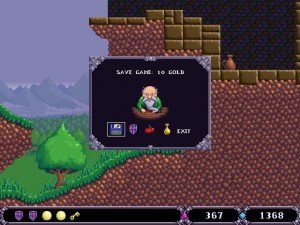Jasper’s Journeys: Inns
 If there’s one game element that defines the Jasper’s Journeys experience more than any other, it’s got to be the inns. Every level has at least one, although it might be difficult to find or reach. At the inns, you can exchange all the treasure you’ve been accumulating for practical stuff, like fruit (increases your ammo supply) or shields (effectively, hit points; you can carry up to three, which means you’ll be able to withstand damage three times without dying), or even, occasionally, potions. Potions are powerups of various sorts that last for the rest of the level, and are sometimes absolutely necessary for looting the level completely. They’re reasonably rare.
If there’s one game element that defines the Jasper’s Journeys experience more than any other, it’s got to be the inns. Every level has at least one, although it might be difficult to find or reach. At the inns, you can exchange all the treasure you’ve been accumulating for practical stuff, like fruit (increases your ammo supply) or shields (effectively, hit points; you can carry up to three, which means you’ll be able to withstand damage three times without dying), or even, occasionally, potions. Potions are powerups of various sorts that last for the rest of the level, and are sometimes absolutely necessary for looting the level completely. They’re reasonably rare.
Most importantly, inns are where you can save your progress. Yes, it’s a save point, that console-standard mechanism despised by PC gamers everywhere. Worse, even: like everything else you can do at an inn, it costs money. Not a lot of money, mind you. A save is the cheapest thing you can buy, and if you’re exploring every level thoroughly, you’re rolling in cash pretty quickly. (If you’re not, you’re pretty much missing the point of the game.) Nonetheless, the fact that it costs money at all makes me reluctant to use it more than necessary. It’s irrational, perhaps, but it’s a real and honest reaction.
Now, when I say that you can save your progress, understand that, despite its retro styling, this game is not so old-school as to respawn its monsters. If you kill something, it stays dead, and you can venture through the area it used to guard in relative safety. Given this, I think the inns actually have an overall positive effect on the experience. If you could save at will, you could make things easier by saving after each and every kill. If you could save any time you went back to the inn, but didn’t have to pay, you could do the same thing, just stretched out over a longer period and made boring because of it. But the way it is, the game essentially spurs me to complete some more significant activity before saving. Make a complete loop of a particular cave, for example, or go as far upward as I can through the clouds (which are solid enough to stand on). The inn becomes your home base, the safe place that you always return to for the sake of securing your gains, which is important, because the tasks I perform before returning are risky. Risky enough that I frequently fail and have to start over — for some definition of “fail”. Sometimes I start over just because I lost more health than I wanted to. At any rate, this cycle is essentially the same as the way you’d play the game if the inns didn’t exist: every time you die, you’d wind up at the start of the level and have to start again. The difference is that, for the most part, you get to choose just how granular it is, how much you want to not have to redo.
 Comments(0)
Comments(0)